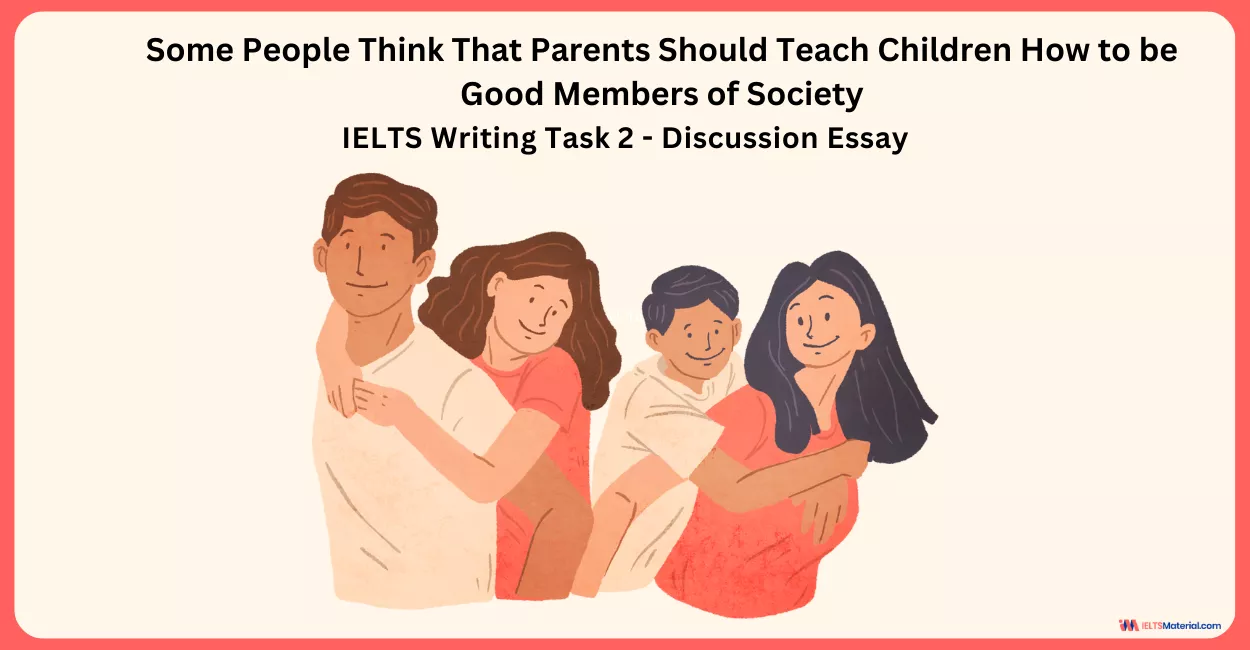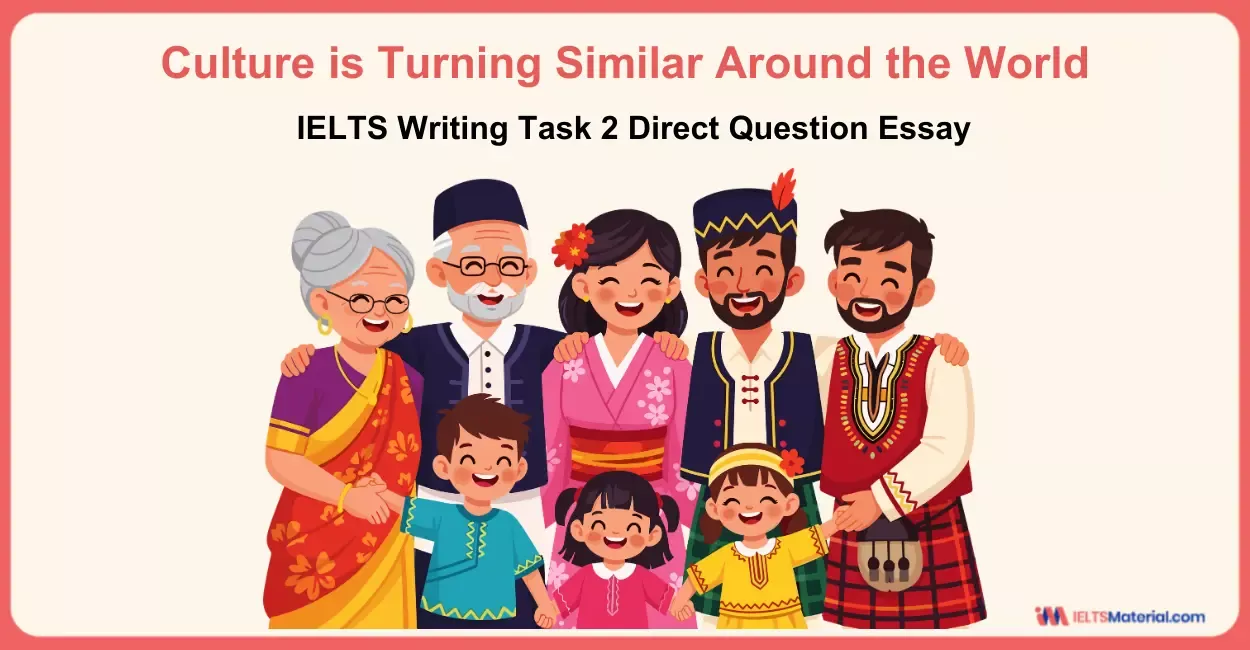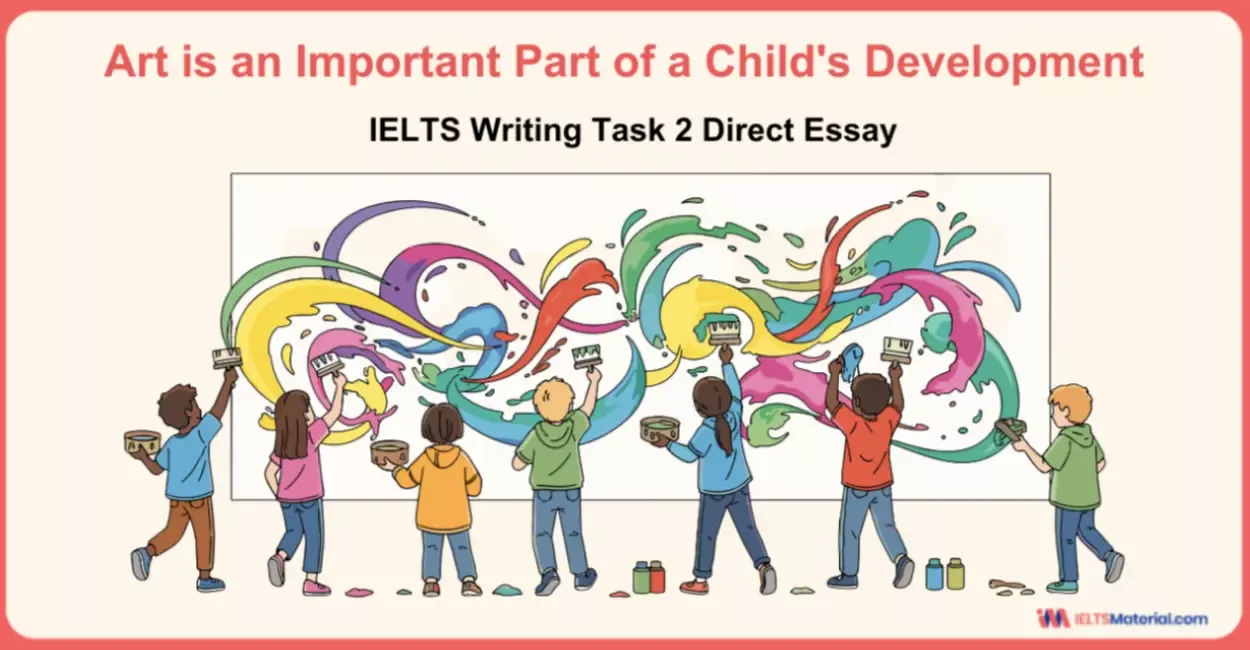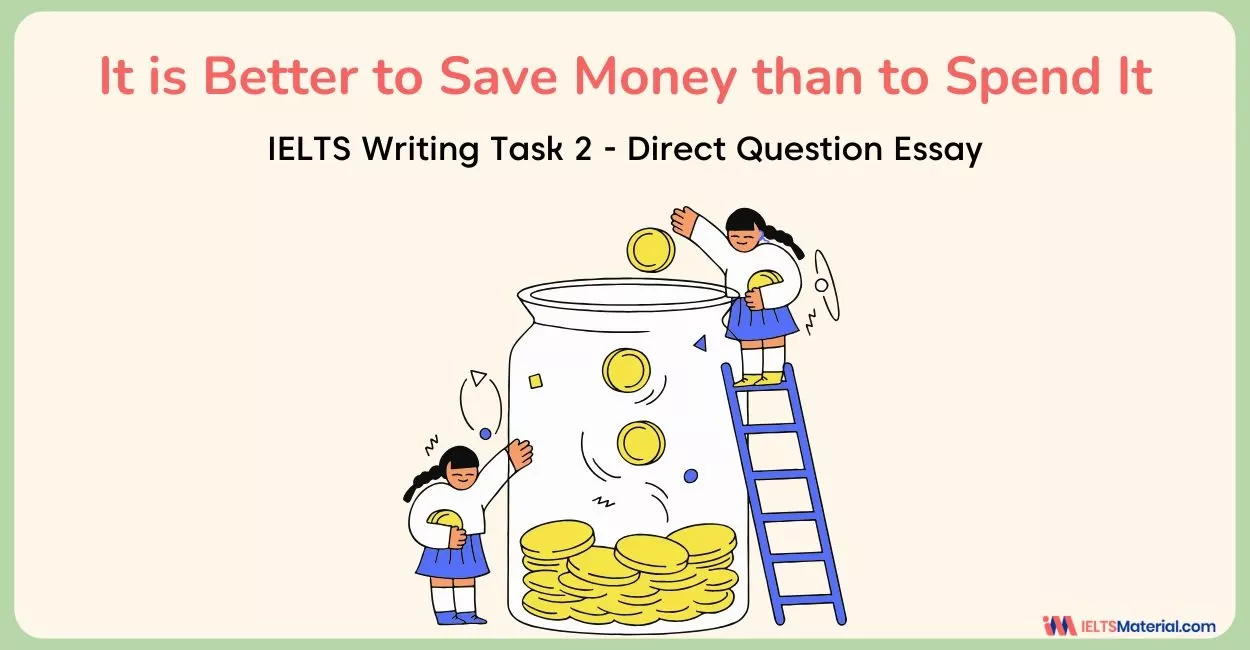It is Important for Children to Learn the Difference Between Right and Wrong at an Early Age – IELTS Writing Task 2
Want a Band 8+ in IELTS Writing? Learn how to tackle "It is Important for Children to Learn the Difference Between Right and Wrong at an Early Age" with sample answers and essential vocabulary!
Table of Contents
- Essay Question for It is Important for Children to Learn the Difference Between Right and Wrong at an Early Age
- Structure Breakdown of "It is Important for Children to Learn the Difference Between Right and Wrong"
- It is Important for Children to Learn the Difference Between Right and Wrong - Band 7 Sample Answer
- It is Important for Children to Learn the Difference Between Right and Wrong - Band 8 Sample Answer
- It is Important for Children to Learn the Difference Between Right and Wrong - Band 9 Sample Answer
- Tips to Write the Essay ‘It is Important for Children to Learn the Difference Between Right and Wrong’

Try AI Essay Checker for Instant Band Score
The IELTS Writing Task 2 topic, "It is Important for Children to Learn the Difference Between Right and Wrong at an Early Age," is an example of a IELTS direct question essays. These essays, also known as Two-Part Question essays, require answering two specific questions clearly in separate paragraphs. To score well, ensure clarity in your responses and support your ideas with relevant examples. Want to practice similar essays? Check out our IELTS Writing practice tests!
Essay Question for It is Important for Children to Learn the Difference Between Right and Wrong at an Early Age
You should spend about 40 minutes on this task.
It is important for children to learn the difference between right and wrong at an early age. Punishment is necessary to help them learn this distinction. To what extent do you agree or disagree with this opinion? What sort of punishment should parents and teachers be allowed to use to teach good behaviour to children?
Give reasons for your answer and include any relevant examples from your own knowledge or experience. You should write at least 250 words.
Structure Breakdown of "It is Important for Children to Learn the Difference Between Right and Wrong"
Type of Essay:Two Part Question or Direct Question Essay Structure Breakdown:
- Briefly explain the question in your own words in one-two sentences. - Add a sentence to state what you’re going to discuss in the body paragraphs.
- Answer the first question in 1-2 sentences. - Explain the point with examples in 2-3 sentences.
- Answer the second question in 1-2 sentences. - Explain the point with examples in 2-3 sentences.
- Summarize the main points made in the essay. |
It is Important for Children to Learn the Difference Between Right and Wrong - Band 7 Sample Answer
Understanding the distinction between right and wrong is a crucial part of a child's development. Some believe that punishment is necessary to teach children this moral lesson. This essay will discuss whether punishment is essential for cultivating moral values and suggest suitable forms of punishment for parents and teachers to employ.
Punishment can be effective in helping children learn right from wrong, but it must be used judiciously. For example, when a child misbehaves, a time-out or loss of privileges can encourage reflection on their actions. Such measures teach accountability without causing harm. However, excessive or harsh punishments may lead to fear or hatred, which can hinder moral development instead of encouraging it.
Parents and teachers should focus on non-physical and constructive punishments that promote learning and self-discipline. For instance, assigning a task like cleaning up a mess they caused or writing an apology letter helps children understand the consequences of their behavior. Additionally, positive reinforcement for good behavior often works better in encouraging ethical conduct than focusing solely on punishment.
In conclusion, while punishment can play a role in teaching children right from wrong, it should be effective and balanced to avoid negative outcomes. Parents and teachers must use appropriate strategies that promote understanding and personal growth rather than fear.
Children to Learn the Difference Between Right and Wrong Band 7 Vocabulary
Now check out some relevant CRIME AND PUNISHMENT Advanced Vocabulary for IELTS 7.0+ used in the above sample answer on punishments and their solutions.
- Judiciously
Meaning: in a way that has or shows reason and good judgment in making decisions
Example: We should use water judiciously if we want the future generations to have enough of it.
- Time-out
Meaning: a pause from doing something (as work)
Example: The people enjoyed some time to rest during the time-out and returned back to work.
- Accountability
Meaning: the acceptance of responsibility for honest and ethical conduct toward others
Example: The owners did not have any accountability in the incident.
- Hinder
Meaning: to limit the ability of someone to do something, or to limit the development of something. hinder someone in something
Example: The storm seemed to hinder the construction of the bridge.
- Positive reinforcement
Meaning: the act of rewarding a positive behavior in order to encourage it to happen again in the future
Example: The teacher applied positive reinforcement to maintain discipline in class.
Ready to ace IELTS Writing? Let us help you boost your skills now! FREE IELTS Writing Demo
It is Important for Children to Learn the Difference Between Right and Wrong - Band 8 Sample Answer
It is widely accepted that learning the distinction between right and wrong is a critical part of a child's upbringing. Some argue that punishment is necessary to instill this understanding effectively. In the following paragraphs, I will discuss whether punishment is essential for instilling moral values and suggest suitable forms of punishment for parents and teachers to employ.
Punishment can be a useful tool in teaching children moral values, but its application should be measured. When children face consequences for their actions, they are more likely to think about their behavior. For example, taking away screen time for lying can help them recognize the importance of honesty. However, relying heavily on punitive measures risks creating an environment of fear, which can undermine trust and hinder a child’s emotional development.
Children learn by example. Hence, it is important for parents to act as a model for how they want their children to behave. Limits and regulations are necessary for children. The most effective ways to punish children are using timeouts or taking away something, such as gadgets. Another approach to assist youngsters in understanding the difference between right and wrong is to take away their privileges or pocket money, encourage them to help with household chores, and then educate them on why they are being punished. These techniques are less likely to have an adverse effect on a child’s mental health.
To conclude, while punishment has its place in teaching children right from wrong, it must be fair and constructive. By adopting non-physical and reflective methods, parents and educators can foster moral understanding and encourage positive behavior without causing emotional harm.
Children to Learn the Difference Between Right and Wrong Band 8 Vocabulary
Have a look at the IELTS Vocabulary for Band 8 sample answer on 'It is Important for Children to Learn the Difference Between Right and Wrong'.
- Instilling
Meaning: to put a feeling, idea, or principle gradually into someone's mind
Example: They are instilling good qualities in the children under their care.
- Punitive
Meaning: intended as a punishment
Example: The court advised some punitive measures for the teenager.
- Constructive
Meaning: intended to help someone or improve understanding
Example: The therapist gave some constructive criticism based on the couple’s behavior.
- Reflective
Meaning: thinking deeply about things
Example: They took some reflective measures to deal with their teenager.
- Adverse
Meaning: having a negative or harmful effect on something
Example: Human activity is having adverse effects on the environment.
- Chores
Meaning: a job or piece of work that is often boring or unpleasant but needs to be done regularly
Example: They divided the daily chores equally among themselves.
It is Important for Children to Learn the Difference Between Right and Wrong - Band 9 Sample Answer
Childhood is indisputably a vulnerable phase for anybody. Since children are gullible, they will walk on the path that is shown to them. Hence, it is necessary for them to learn the difference between right and wrong. I support the opinion that punishments have the capability to shape the future of a child and will discuss the extent to which punishment is necessary for moral development and explore appropriate disciplinary strategies for parents and educators.
Punishment, when applied thoughtfully, can serve as an effective means of teaching children about consequences. A measured response to misbehavior, such as temporary withdrawal of privileges, can help children associate actions with outcomes. For example, if a child breaks a rule by hitting a sibling, losing access to a favorite toy can encourage them to reflect on the importance of kindness. However, overly harsh or inconsistent punishments risk fostering resentment or fear, which can impede emotional intelligence and moral growth.
Effective disciplinary practices should aim to correct behavior while promoting self-awareness and accountability. Non-physical methods like setting logical consequences or involving children in restitution are more constructive. For instance, a child who damages school property could be tasked with helping to repair or clean it, thereby understanding the impact of their actions. Additionally, positive reinforcement for desirable behavior can be a powerful motivator, reducing the need for punitive measures altogether.
In summary, while punishment has a role in teaching children right from wrong, it should be used sparingly and paired with constructive strategies that nurture understanding and empathy. By emphasizing reflection and ownership, parents and educators can effectively guide children toward moral and ethical behavior.
It is Important for Children to Learn the Difference Between Right and Wrong Band 9 Vocabulary
Use the following Band 9 vocabulary while writing your IELTS Writing Task 2 sample essay on 'It is Important for Children to Learn the Difference Between Right and Wrong' and improve your score.
- Indisputably
Meaning: in a way that cannot be challenged or denied
Example: He is indisputably the most kind man in the whole community.
- Vulnerable
Meaning: able to be easily hurt, influenced, or attacked
Example: The rangers found the tiger in its most vulnerable state.
- Gullible
Meaning: easily deceived or tricked, and too willing to believe everything that other people say
Example: Reena is gullible and gets misguided by people.
- Resentment
Meaning: a feeling of anger because you have been forced to accept something that you do not like
Example: We should not have resentment in our heart or it won’t let us live peacefully.
- Restitution
Meaning: act of making up for damages or harm
Example: Although there is no need of putting them in restitution as they are not interested to rectify themselves.
- Ethical
Meaning: relating to beliefs about what is morally right and wrong
Example: The most ethical step right now is to ban animal testing for beauty products.
- Sparingly
Meaning: in small amounts, or without wasting any
Example: The chef used salt and sugar sparingly for the food made for the patients.
Are you confused about writing an IELTS Essay ? Book a free trial & gain insights from our IELTS Experts!
Tips to Write the Essay ‘It is Important for Children to Learn the Difference Between Right and Wrong’
Have a look at the 5 tips specifically meant to help you frame the essay ‘It is Important for Children to Learn the Difference Between Right and Wrong’ for a better IELTS band score below.
- Since it is a two-part question essay, ensure you explicitly answer both parts: whether punishment is necessary and what types of punishment are suitable. Use separate paragraphs for each. Example: In Body Paragraph 1, discuss the necessity of punishment and support it with examples like time-outs for minor misbehavior. In Body Paragraph 2, recommend non-physical, constructive punishments.
- You should incorporate terms such as ‘accountability’, ‘ethical conduct’, ‘logical consequences’, ‘positive reinforcement’, ‘self-awareness’, and ‘restitution’. These words directly relate to moral development and disciplinary practices, boosting your lexical resource score. Learn more Crime and Punishment Vocabulary.
- Always support your arguments with specific, relatable examples. For instance, mention how losing privileges like screen time for lying teaches honesty or how cleaning a mess educates responsibility.
- You need to highlight the importance of pairing punishment with positive reinforcement. Explain that overly harsh punishments can lead to resentment, while rewards for good behavior encourage moral growth. This balanced view demonstrates critical thinking.
- Avoid emotionally charged language (e.g., children must be punished harshly). Instead, using measured phrases like punishment should be constructive and sparing. A balanced, neutral tone reflects a thoughtful analysis, vital for a high IELTS band score.
- Bonus Tip: Make sure to use relevant connectors and linking words for IELTS writing task 2 in your answers. They will help to link ideas or parts of a sentence or paragraph together, thereby increasing your score based on coherence.
Join us in our IELTS webinars to learn proven tricks to handle IELTS Writing Task 2 essays! Explore Now!
Also Check:
- Young people from wealthy countries are spending a short time doing unpaid work - IELTS Writing Task 2
- People have more than One Job at the Same Time- IELTS Writing Task 2
- Crime Novels and TV Crime Dramas are Becoming Popular - IELTS Writing Task 2
- City Planners New Designs Include Setting Up Commercial Places in Different Areas
- Many Processed Foods and Ready-Made Meals Contain Preservatives and Chemicals
- Interviews Form the Basic Selection Criteria for Most Large Companies
- With Increasing Populations and Ever Growing Urban Centers Many Countries are Losing Their Natural Beauty Spots
Practice IELTS Writing Task 2 based on Essay types

Start Preparing for IELTS: Get Your 10-Day Study Plan Today!
Explore other Direct Question Essays
Recent Articles

Haniya Yashfeen


Prity Mallick

Kasturika Samanta








Post your Comments
16 Comments